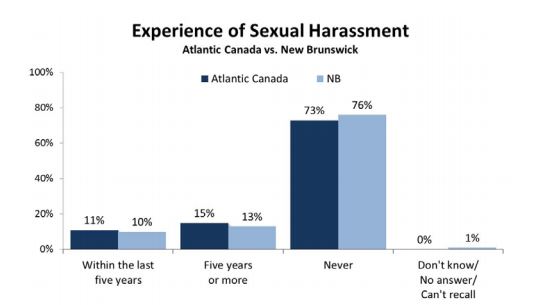A new poll has found that 40 per cent of women in Atlantic Canada report having experienced sexual harassment — with nearly half of women in Nova Scotia saying they’ve been sexually harassed.

The poll, produced by Corporate Research Associates (CRA), asked men and women in the Atlantic region when, if at all, they last experienced sexual harassment.
Don Mills, chairman and CEO of CRA, said they decided to find answers as a result of the ongoing public discussion of harassment in Canada.
READ MORE: ‘Me too’ backlash has women worried about losing career opportunities
“Although the incidence of sexual harassment reported, particularly among women, is significant, it may not be as high as some might have expected,” said Mills.
“The results nonetheless serve to underscore the ongoing need to address the long-standing societal problem.”
Although the percentage of Nova Scotia women who reported sexual harassment was slightly elevated when compared to the rest of Atlantic Canada, the CRA found that a “significant minority” of women in all of the other provinces in the region reported experiencing sexual harassment.

The poll found that 35 per cent of women in New Brunswick reported having been sexually harassed while nearly four in 10 women in both Newfoundland and P.E.I. reported sexual harassment.

Get breaking National news
When polling the general population, which included both men and women, all provinces had a significant decrease in reports of sexual harassment.
According to the data, three in 10 Nova Scotia residents have experienced sexual harassment while one-quarter of the adult population in the other Atlantic provinces had experienced sexual harassment.
WATCH: Support victims of gender discrimination in the workplace

The poll was carried out as part of the CRA’s quarterly telephone survey of Atlantic Canadians.
The company’s results in Nova Scotia are based on a sample of 384 adult Nova Scotians, conducted from Febr. 1 to 25, 2018, with overall results accurate to within ± 5.0 percentage points, 95 out of 100 times.
In New Brunswick, the company based their results on a sample of 384 adult New Brunswickers, conducted during the same time period, with overall results accurate to within ± 5.0 percentage points, 95 out of 100 times.








Comments
Want to discuss? Please read our Commenting Policy first.